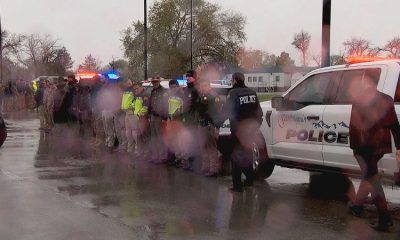Covid-19
Johnson & Johnson pause could hurt efforts to combat vaccine hesitancy

WASHINGTON— In a potential blow to efforts to combat COVID-19 vaccine hesitancy, U.S. regulators issued a pause on the distribution of Johnson & Johnson’s single-dose COVID-19 vaccine after six women developed a rare form of stroke in combination with low levels of blood platelets.
On Tuesday morning, the Food and Drug Administration and Centers for Disease Control and Prevention recommended providers stop administering the vaccine “out of an abundance of caution,” while the agencies review the cases and assess their potential significance.
The six events appeared in the administration of 6.8 million Johnson & Johnson/Jannsen shots in the United States. The condition was fatal in one patient and another is in critical condition. Each woman was under 50 years old.
People who received the Johnson & Johnson/Jannsen shot are encouraged to monitor for symptoms and contact their health care provider if they experience severe headaches, abdominal pain, leg pain or shortness of breath within three weeks after vaccination. These symptoms are different from the mild flu-like symptoms that many people experience in the days after getting the shot, health officials explained.
The distribution of the AstraZeneca vaccine was halted temporarily in Europe due to a potential link to rare blood clots and low platelets. The events resulted in more than a dozen fatalities. Both the AstraZeneca and J&J vaccines use an adenovirus vector to deliver the genetic code.
U.S. officials assured the public that similar complications have not been associated with the Pfizer and Moderna vaccines, which use an mRNA vector. European regulators reported several incidents of blood clotting episodes involving Moderna and Pfizer shots. In a Tuesday statement, Moderna reported there was no evidence of its shot being associated with thrombotic events.
According to White House COVID-19 response coordinator Jeffrey Zients, the reports of adverse side effects “will not have a significant impact” on the U.S. vaccination campaign, which has already reached more than a quarter of the adult population. The J&J vaccine accounted for less than 5% of the recorded 190 million shots administered so far.
“We have more than enough supply of Pfizer and Moderna to continue the current pace of about 3 million shots per day,” Zients told reporters Tuesday. “That puts us well on pace to meet the president’s goal of 200 million shots by his 100th day in office.” The federal government will be working with state, local and pharmacy partners to reschedule people slated to receive the Johnson & Johnson shot.
It will likely be a matter of days, or potentially longer, for the CDC’s Advisory Committee on Immunization Practices (ACIP) to review the data and possibly issue new recommendations for the use of the J&J shot. Members of the independent advisory group are scheduled to meet Wednesday.
In the meantime, severe but rare incidents have been reported extensively by every major news outlet. It came on the heels of Georgia, Colorado and North Carolina closing vaccination sites after reports of minor, adverse reactions to the J&J shot. Social media was abuzz with concerned comments and vaccine skeptics who claimed vindication.
The most recent public opinion polls showed that vaccine hesitancy was starting to wane among some Americans. By late March, more than half of respondents were either vaccinated or eager to get a shot as soon as possible. Those who said they were unlikely to get the vaccine declined to one-fifth from a quarter of respondents in December.
“I think we do a bad job, as humans, in thinking about risk,” Fortune noted. “We like to think of things as either safe or not safe in black or white terms. Of course, nothing in life is black and white but it’s much more nuanced than that in reality.”
In reality, the risk of dying from COVID-19 in the United States is over a thousand times higher than the risk of stroke from the Johnson & Johnson shot. The risks of the virus also dramatically outweigh the extremely rare but severe allergic reactions reported with the Pfizer and Moderna shots.
“It’s about the risk of a shark attack if you’re swimming in the ocean. It’s a very rare event. So don’t panic. The overwhelming probability is that you’re going to be fine,” said Dr. James McDeavitt, senior vice president and dean of clinical affairs at Baylor College of Medicine.
Rather than undermining public confidence in the vaccine, Dr. Anthony Fauci, chief White House medical adviser, assured that the immediate response by the FDA and CDC to the adverse incidents demonstrated U.S. regulators’ commitment to safety and following scientific evidence.
“I don’t think it was pulling the trigger too quickly,” Fauci said, when asked if regulators overreacted to the rare but serious events. “The fact that a pause was done, I think just is a testimony to how seriously we take safety.”
Leaders of the Biden COVID-19 response team also used the incident to emphasize the safety of the Moderna and Pfizer mRNA shots, which Fauci said raised “no negative red flag signals” after being administered to more than 110 million Americans.
The path forward for the Johnson & Johnson vaccine will become clearer in the coming days, but the recent announcement by the FDA and CDC represented yet another stumbling block for the iconic pharmaceutical company.
The availability of the single-dose J&J vaccine was filled with promise. The shot proved 74% effective in preventing mild to moderate COVID-19 and 100% effective in preventing hospitalizations or death from the virus two weeks after inoculation.
Yet, J&J struggled to get out of the gate. It faced a series of production complications that were unrelated to the efficacy or safety of the vaccine.
After announcing it lacked production capacity to meet its goal of delivering 100 million vaccine doses by June, the White House forced Johnson & Johnson into a partnership with pharmaceutical competitor Merck to accelerate production.
Now, all of the J&J shots available to states, pharmacies and health care providers are on hold while the CDC Advisory Committee on Immunization Practices reviews the data. States and health care providers are making determinations about distributing doses based on the CDC and FDA pauses.
The incident will also have broader implications on vaccine supply globally. In reviewing the cases of blood clots in the U.S., Johnson & Johnson decided to delay its vaccine rollout in Europe.
European authorities recommended the shot for use last month. The decision comes as a blow to the E.U. which has seen much slower progress in its vaccination campaign and a rising number of COVID-19 cases
-

 Local News2 weeks ago
Local News2 weeks agoTech companies request a judge to overturn a Utah social media legislation
-

 Local News2 weeks ago
Local News2 weeks agoReaction to Gov. Cox’s remarks at the GOP state convention in 2024
-

 Utah2 weeks ago
Utah2 weeks agoCouple finds card skimmer at Salt Lake County grocery store
-

 Utah2 weeks ago
Utah2 weeks agoFollowing a deadly hit-and-run incident on I-15, a Santaquin police officer was identified
-

 Local News1 week ago
Local News1 week agoTransgender activists flood Utah tip line with hoax reports to block bathroom law enforcement
-

 Local News1 week ago
Local News1 week agoHow much snow did Utah got during the May storm?
-

 Local News1 week ago
Local News1 week agoThe entertainment district plan has received input from the Utah Taxpayer’s Association
-
Local News1 week ago
Crews face challenges getting to scene where two skiers died in late-season avalanche






Leave a Reply